Anti-democratic campaign of pro-U.S. forces against al Kubaysi failed
All seats were taken at the two public meetings with Abduljabbar al-Kubaysi in Vienna on March 24th and 25th. On both days, about 200 people came to hear about the situation in Iraq and the perspectives of the resistance from the point of view of someone who is involved.
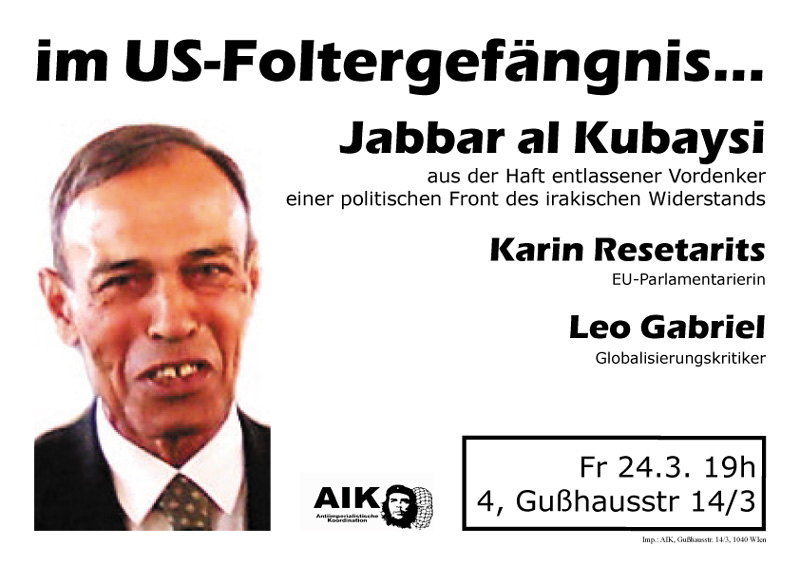
Al-Kubaysi is one of the figureheads in the project to create a political front of the Iraqi resistance to unite all the different currents and organisations who fight against the occupation in various ways. From September 2004 to December 2005, al-Kubaysi had been a political prisoner of the U.S. occupation forces in Iraq. Now he has been touring Europe to speak at political meetings in Spain, Portugal, Italy, France, Austria, and other countries.
The meetings in Vienna were faced with a massive campaign of intimidation and slander by forces supporting the occupation. Lecture halls had been rented at the University of Vienna, but the administration backed out, citing “serious security considerations”. The same happened at a second location.
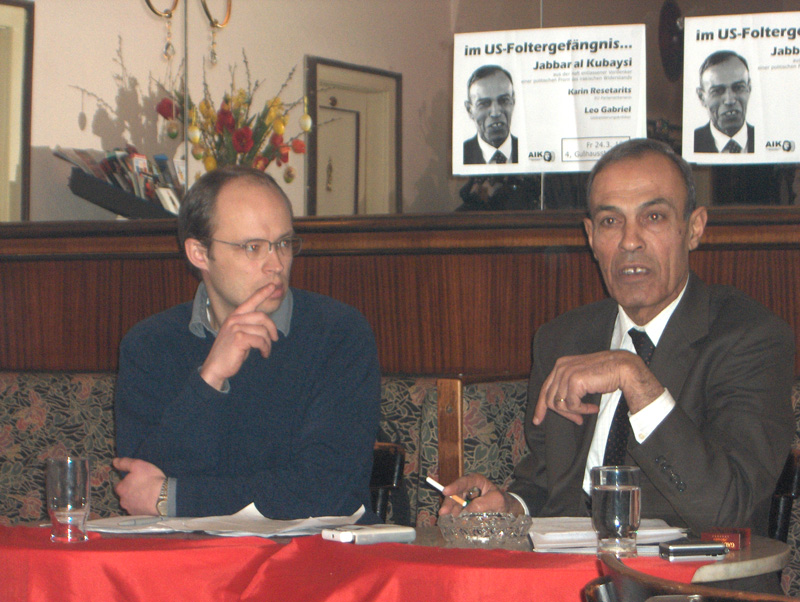
Mostly affected by the libel campaign was the Austrian EU parliamentarian Karin Resetarits. She was targeted by the Documentation Centre of Austrian Resistance (DÖW), an organisation with close ties to the government which has since 1989/91 degenerated into a pro-Israel lobby group and has been denigrating the communist resistance against fascism and called any opposition to the actions of the Israeli regime “anti-semitic”. Hate mail was also sent out be the official Austrian Jewish Community (Kultusgemeinde), the Iraqi Communist Party, running dogs of the puppet regime in Baghdad (SCIRI) and pseudo-leftist advocators of Israel.
They were not able to silence the voice of resistance. It was significant that so many people showed up and showed their solidarity with the Iraqi resistance and that Leo Gabriel, a representative of the Austrian Social Forum, participated in the discussion—that means that the resistance is seen as a factor for a just peace in Iraq. Although Resetarits in the end yielded to the pressure and did not attend the meetings, she refused the demands of the neo-colonialists to dissociate.
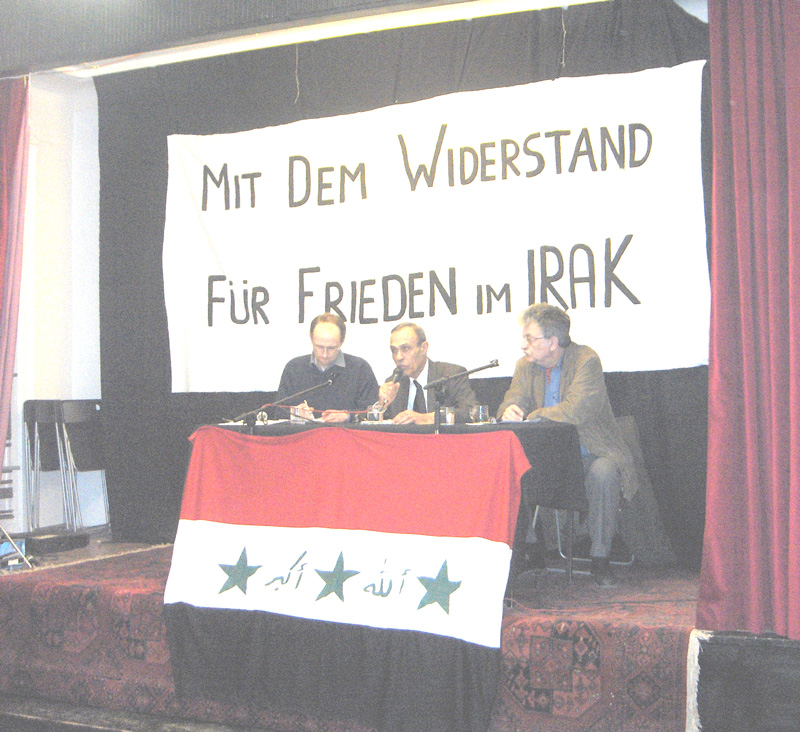
At the meetings, al-Kubaysi stressed, that contrary to the mainstream media reports, sectarian conflicts have not shaken the unity of Iraq as an Arab country. The divisions are kindled by the occupiers and their pro-Iranian puppet regime of al-Hakim. The mobilisations of the dominant movement of Muqtada al-Sadr among the poor Shi’ite population for unity with the Sunnis, even after the attack Samarra, shows that it is not the presence of US troops that prevents civil war. The split is in fact not between Sunnis and Shiites, but between opponents and supporters of the occupation among both sects. Al-Kubaysi said that eventually Muqtada al-Sadr will join the resistance front, but more efforts will be needed to form such an alliance.
Al-Kubaisy predicted that due to the antagonism with the pan-Arab movement of al-Sadr, the pro-Iranian Shiite forces wouldn’t be able to form a government, and that the Kurdish president Talabani would finally nominate the CIA’s candidate, Iyad Allawi, as prime minister. As all sectors of the population hate Allawi, this would boost the resistance.
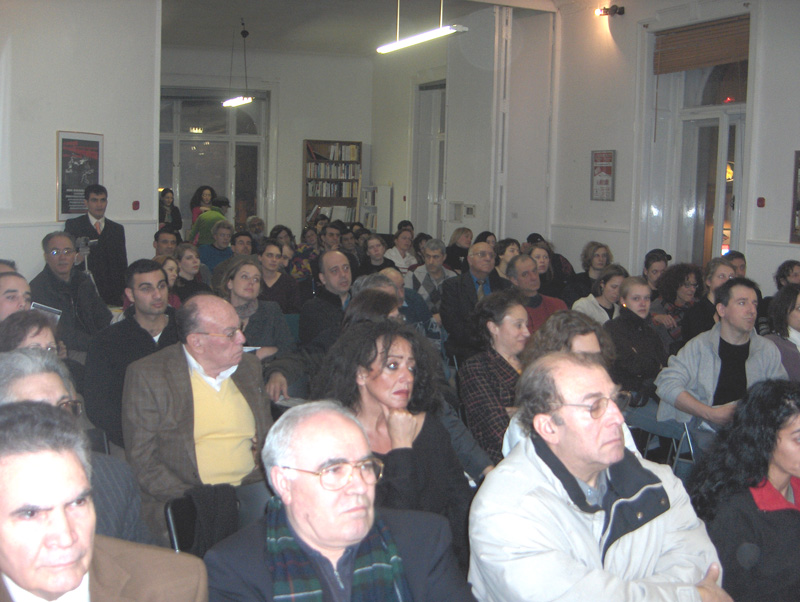
Leo Gabriel of the Austrian Social Forum called for dialogue with the Iraqi resistance, but he warned, that military means are not sufficient to counter the terrorism of the Empire. The United States and their allies can only be stopped by a range of actions on different levels, including the global anti-war movement. He referred to the success of the movement against the war against Vietnam, especially in the United States. Leo Gabriel criticized al-Kubaisi, saying that his concept of a constitution of equal and free citizens, inspired by the French Revolution, is not sufficient; models from Latin America provide for autonomy for religious and national minorities.
Anti-imperialists stressed that an end of the occupation and a just peace mostly depend on the development of the resistance of the Iraqi people. The anti-war movement should not be self-centred and must not try to force the resistance to adopt their “politically correct” concepts—the anti-war movement has to support the resistance. Only an anti-imperialist front that connects the various centres of popular resistance against the American Empire—as proposed by the president of Venezuela, Hugo Chávez—can end the terrorist war and imperial tyranny.
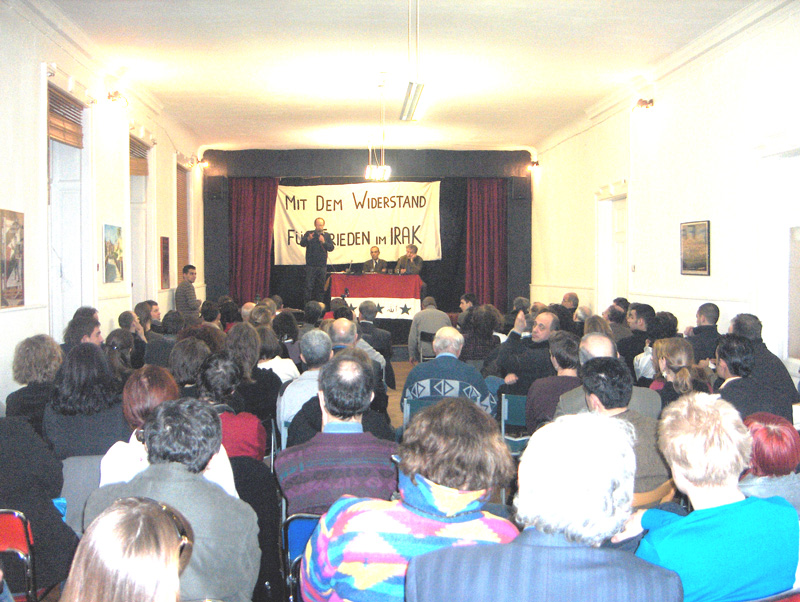
Leo Gabriel’s call for dialogue was well received. The first acid test could be the mobilization against the visit of George W. Bush to Vienna on June 21st. The forces around the Social Forum should accept the anti-imperialists as part of the movement and refrain from sectarianism and exclusion.
Anti-Imperialist Camp
Vienna, March 27th, 2006